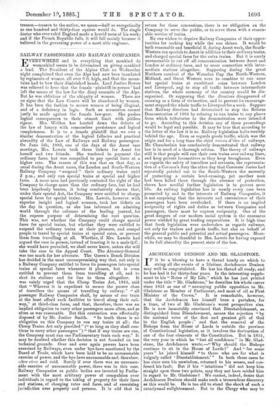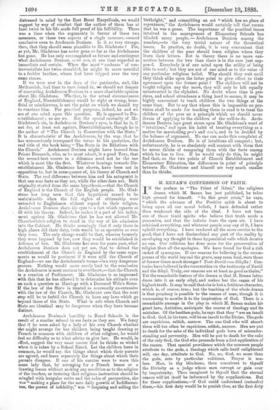ARCHDEACON DENISON AND MR. GLADSTONE.
IF it be a blessing to have a thread handy on which to string all the events of a lifetime, Archdeacon Denison may well be congratulated. He has his thread all ready, and he has had it for thirty-four years. In the interesting supple- ment to his " Notes of My Life," which he has just printed under the title " Mr. Gladstone," he describes his whole career since 1851 as one of " unvarying public opposition to Mr. Gladstone as Member of Parliament, and most of all as First
Minister of the Crown." It is remarkable, however, that the Archdeacon has himself been a partaker, for a time, of two of Mr. Gladstone's worst prospective sins. He is now immutably convinced that Disestablishment, as distinguished from Disendowment, means the rejection " by the national voice of the first and greatest gift of God to the English people ;" and that the removal of the Bishops from the House of Lords is outside the province of Constitutional legislation, as it involves the destruction of one of the four elements of the Constitution. But in 1851, the very year in which he " lost all confidence " in Mr. Glad- stone, the Archdeacon wrote,—" Why should the Bishops continue to sit in the House of Lords1" And " for some years " he joined himself " to those who are for what is vulgarly called Disestablishment.' " In both these cases he has since seen his unwisdom, returned to his senses, and con- fessed his fault. But if his " intuitions" did not keep him straight upon these two points, may they not have misled him in regard to Mr. Gladstone I We cannot, indeed, desire that Archdeacon Denison should make such a tremendous discovery as this would be. He is too old to stand the shock of such a cataclysmal enlightenment. But to the Clergy who may be distressed in mind by the East Brent Encyclicals, we would suggest by way of comfort that the author of them has at least twice in his life made full proof of his fallibility. There was a time when the arguments in favour of these two measures, or these two aspects of a single measure, seemed conclusive even to Arcdeacon Denison. Is it so very strange, then, that they should seem plausible to Mr. Gladstone ? For, as yet, Mr. Gladstone has never gone so far as the Archdeacon has gone. He has only contemplated as future and contingent what Archdeacon Denison, more suo, at one time regarded as immediate and certain. When the most " cocksure ' of con- troversialists has twice stumbled, he might be more merciful to a feebler brother, whose feet have tripped over the very same stones.
If we were now in the days of the patriarchs, and, like Methuselah, had time to turn round in, we should not despair of converting Archdeacon Denison to a more charitable opinion about Mr. Gladstone. Whether, in the actual circumstances of England, Disestablishment would be right or wrong, bene- ficial or mischievous, is not the point on which we should try to eonvince him. For practical purposes, indeed, he and we are of one mind upon this question. He is opposed to Dis- establishment ; so are we. But the special enormity of Mr. Gladstone's sin, in Archdeacon Denison's eyes, is that he is, if not for, at least not against, Disestablishment, though he is the author of " The Church in Connection with the State." It is characteristic of the Archdeacon, by the way, that he has unconsciously transposed the terms in his quotation, the real title of the book being The State in its Relations with the Church." Archdeacon Denison might have learned from Prince Bismarck, who, as he must admit, is a good Tory, that the second-best course in a dilemma need not be the one which is most like the first. Whatever leanings towards Dis- establishment Mr. Gladstone has shown, have been not in
• opposition to, but' in consequence of, his theory of Church and State. The real difference between him and his antagonist is that one sees facts as they are, while the other does not. Both originally started from the same hypotbesis,—that the Church of England is the Church of the English people. Mr. Glad- stone has long seen that this hypothesis ceased to be maintainable when the full rights of citizenship were extended to Englishmen without regard to their religion. Archdeacon Denison shuts his eyes to a fact which squares so ill with his theory. Indeed, he makes it a part of his indict-,, ment against Mr. Gladstone that he has not allowed- Mr. Chamberlain's religion to stand in the way of his admission into the Cabinet. He thinks seemingly that if only those in high places did their duty, tests would be as operative as ever they were. The only change would be that, whereas formerly they were imposed by law, now they would be established in defiance of law. Mr. Gladstone has seen for years past, what Archdeacon Denison does not yet see, that to defend the establishment of the Church in England by the same argu- ments as would be pertinent if it were still the Church of England—we use the Archdeacon's terms—Lis a very dangerous process. Nothing would more surely lead to the conclusion the Archdeacon is most anxious to overthrow,—that the Church is a creation of Parliament. Mr. Gladstone is so impressed with this that he has allowed it to determine his attitude even on such a question as Marriage with a Deceased Wife's Sister. If the law of the State is treated as necessarily co-extensive with the law of the Church, Mr. Gladstone sees that the next step will be to forbid the Church to have any laws which go beyond those of the State. What is safe when Church and State are identical may be dangerous when they have become distinct.
Archdeacon Denison's hostility to Board Schools is the result of a similar refusal to see facts as they are. We fancy that if he were asked by a lady of his own Church whether she might arrange for her children being taught drawing or French in common with children of other religions, he would feel no difficulty as to what advice to give her. He would, in effect, suggest the very same course that he thinks so wicked when it is taken by a School Board. Let the children learn in common, he would say, the things about which their parents are agreed, and learn separately the things about which their parents disagree. If one of his curates were to warn this same lady that, by arranging for a French lesson or a drawing lesson without making any condition as to the religion of the teacher; or insisting that religious instruction should be mingled with irregular verbs and the rules of perspective, she was " making a place for the, sure daily growth of Indifferent- ism, the parent of infidelity,' was " despising and selling the birthright," and committing an act " which has no place of repentance," the Archdeacon would certainly tell that curate that he was a goose. The importance of the practical issues involved in the management of Elementary Schools has blinded many people, — Archdeacon Denison among the number,—to the very trivial nature of the theoretical issues. In practice, no doubt, it is very convenient that the children of the poor should learn religion where they learn their letters. But in theory there is no more con- nection between the two than there is in the case just sup- posed. Everybody is of one mind upon the utility of being able to read ; but they are not of one mind as to the value of any particular religious belief. Why should they wait until they think alike upon the latter point to give effect to their agreement upon the former point ? The children will not be taught religion any the more, they will only be left equally uninstructed in the alphabet. No doubt where time is pre- cious, and school attendance a thing hard to secure, it may be highly convenient to teach children the two things at the same time. But to say that where this is impossible no pro- vision shall be made for teaching them to read is to treat the children of the poor on a principle 'Which we should never dream of applying to the children of the well-to-do. Arch- deacon Denison lays great stress upon Mr. Gladstone's want of "intuitions," and upon his habit of treating everything as a matter for marshalling pro's and con's, and to be decided by the balance of argument. No one can make this complaint of Archdeacon Denison. He is of intuitions all compact ; but, unfortunately, he is so absolutely well content with them that he 'never thinks of comparing them with the facts among which he has to live. If he would only do this, he might find that, on the two points of Church Establishment and Elementary Education, the differences in point of principle between Mr. Gladstone and 'himself are very much smaller than he thinks.











































 Previous page
Previous page